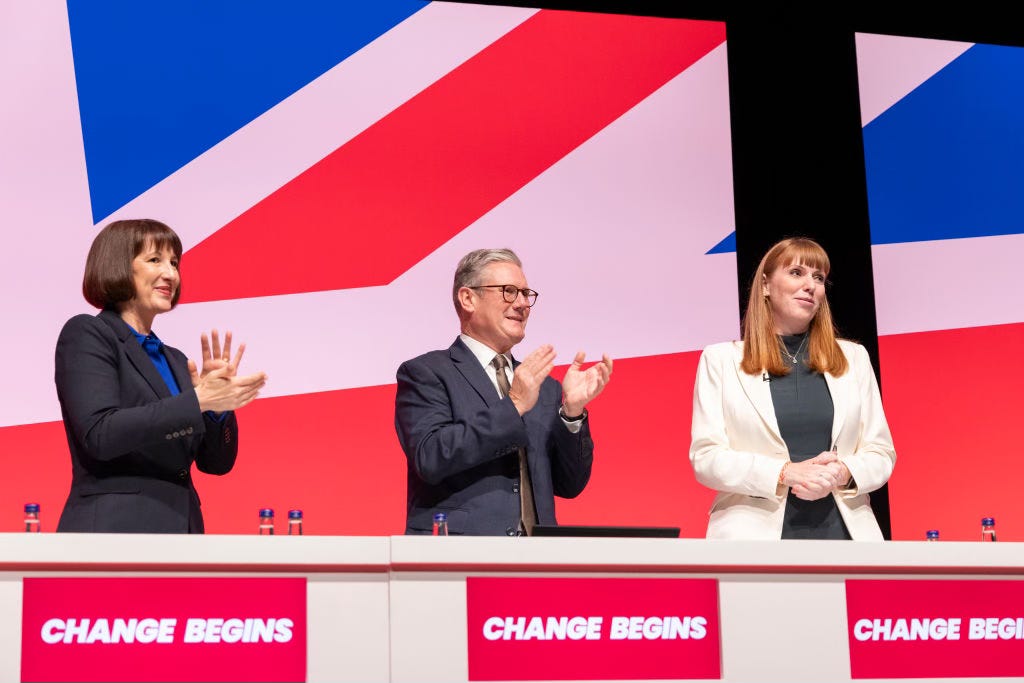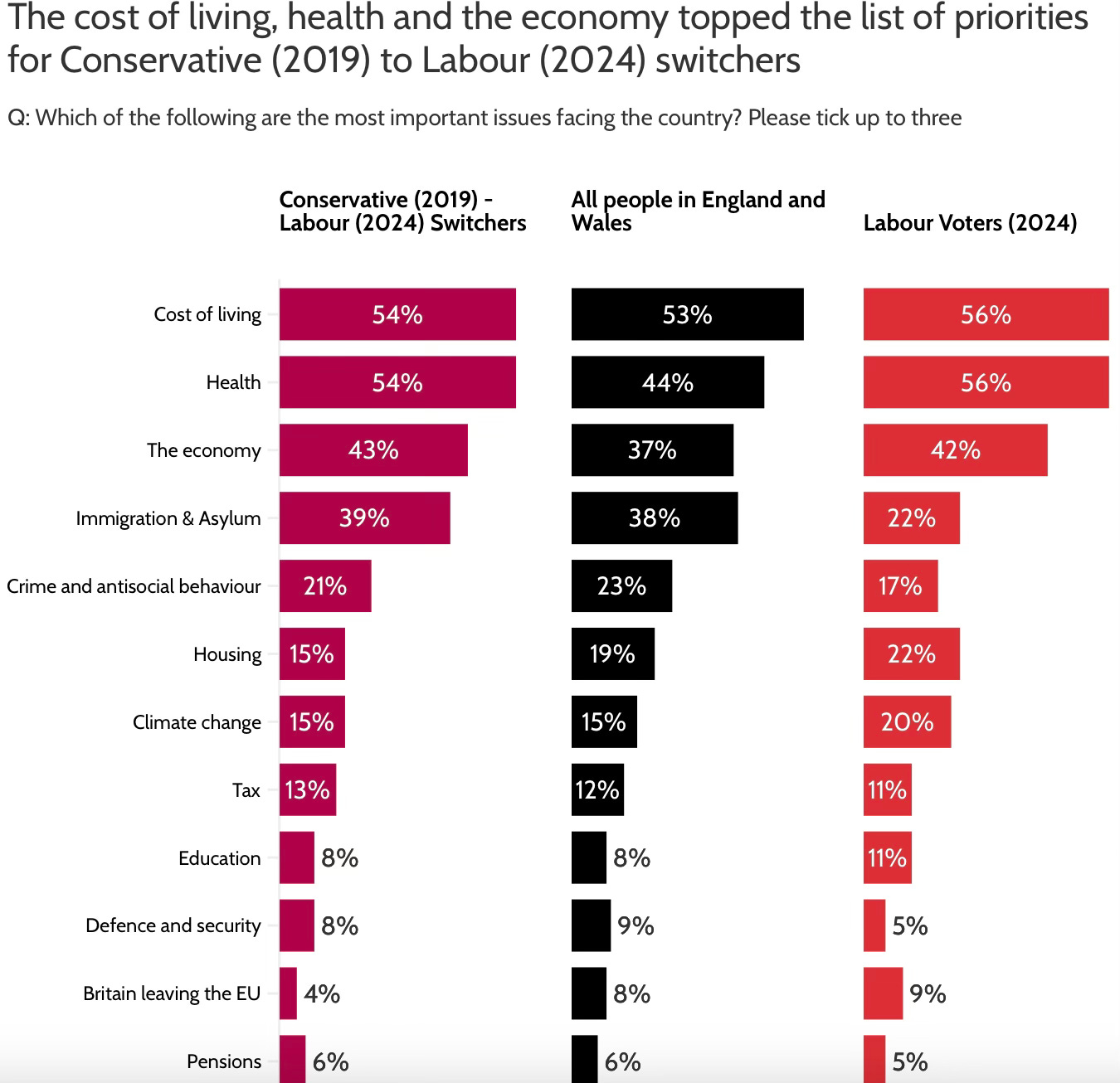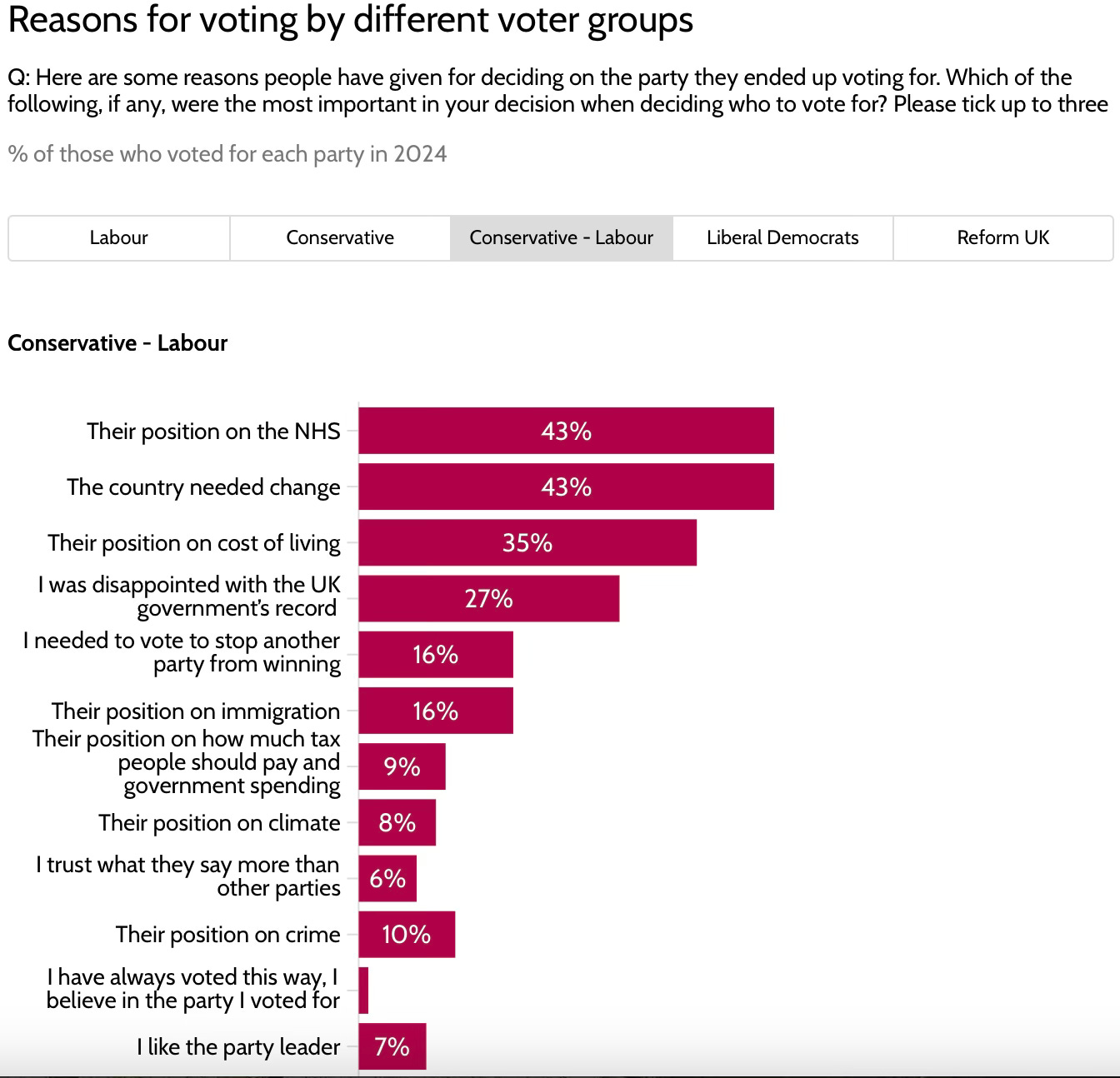Lessons for America from UK Labour
What Democrats and Republicans could learn from Labour’s decisive turn to the middle—and difficulties translating electoral victory into popular governance.

After years of electoral mishaps and party extremism, the UK Labour Party under leader Keir Starmer won a decisive victory in the 2024 general election by reassuring voters that it is a competent and moderate party focused on the priorities of “Middle Britain.”
Labour went from winning only 212 seats in 2019 to picking up an astonishing 411 seats in 2024, the second highest in the party’s history, with 14 percent of its vote share this year coming from Conservative to Labour vote switchers, according to a comprehensive new post-election analysis conducted by Labour Together, a think-tank with close links to the Starmer team. These persuadable voters ultimately made the difference for Labour. As the report states: “In a Conservative-Labour contest, every one of their votes counts double. They subtract one vote from the Conservative pile and add one to Labour. This is what makes them decisive. They are the most important group to win.”
Many factors contributed to the Labour landslide, including voter fatigue and a desire for change after years of failed governance by Conservatives, the collapse of the Scottish National Party (SNP) from 48 seats to just nine, and the movement of the Tory coalition to other parties including the anti-immigration Reform UK.
But Labour’s decisive focus on voter persuasion—and the Starmer team’s ruthless rejection of the toxic Jeremy Corbyn years—helped to position the party as the pragmatic and sober-minded face of political competence focused on the priorities of workers and their families.
As Starmer explained to Anne Applebaum in an interview prior to the July 4 election:
“Populism,” Starmer told me Saturday, thrives on “a disaffection for politics. A lack of belief that politics can be a force for good has meant that people have turned away in some cases from progressive causes.” We were speaking in Aldershot, a garrison town known as the unofficial home of the British army, where he had just met with veterans. “We need to understand why that is, to reconnect with working people,” he said. “The big change we’ve made is to restore the Labour Party to a party of service to working people. I believe we’d drifted too far from that.”
Labour Together’s post-election survey of more than 10,000 British voters reveals a few key issues dominated all others in the minds of these Conservative to Labour vote switchers: mainly the cost of living, healthcare, and the economy along with a general desire for change.
Labour’s manifesto promised a series of practical improvements to the National Health Service including cutting waiting times by adding 40,000 new appointments weekly; doubling the number of cancer scanners; creating a new dental plan; and adding 8500 new mental health staffers and more family doctors. The party’s pledges on cost of living issues included plans to build 1.5 million new homes and tackle housing affordability; start a national clean energy company to lower energy costs and better insulate homes paid for by windfall tax on oil and gas corporations; and steps to ensure the national minimum wage reflects the true cost of living for families.
Starmer and Labour also wisely played up “Middle Britain” cultural values by being patriotic, taking a firm line on immigration and borders, and refusing to re-litigate the Brexit vote (notably, 63 percent of Conservative to Labour switchers voted “Leave” in the 2016 referendum).
The combination of these issue positions—and the party’s reassuring cultural posture and leadership—greatly enhanced Labour’s fortunes with UK voters tired of 14 years of Tory rule.
For American political parties, these successful campaign steps by Labour suggest that a mainstream party with a trustworthy and pragmatic figurehead focused on the basic needs of working people can build a strong majority coalition. Persuadable voters in both countries—including a still sizable number of Americans ahead of our presidential election—value basic leadership skills, a commitment to economic security for families, a patriotic love of country, and normal, non-extremist cultural positions.
Democrats and Republicans should also remember that voters in the middle (whether in the UK or America) remain deeply skeptical of politicians, political parties, the media, and other major institutions of government. This anger and skepticism has a way of blowing back on those in power.
For example, according to the Labour Together report, a mere 14 percent of Britons said they trusted the government “to place the needs of the nation above those of their party” ahead of the election. Subsequently, voter turnout in the UK hit its lowest level since 2001 at 59.7 percent. Likewise, smaller parties did much better in 2024 than both major parties among those voters who thought democracy was functioning “badly” in the UK.
A cautionary note for Democrats and Republicans is also in order looking at Labour’s challenges since taking charge in July.
As YouGov reported ahead of the Labour Party conference that just started in Liverpool, public favorability of the party has plunged in just three months—from nearly half of voters viewing Labour in a good light after the election to only one in three today. Notably, a good chunk of those turning against the party in recent months emerged from Labour’s own ranks.
After a genuinely impressive general election result, Labour’s honeymoon with voters was very short-lived as perceptions of the party have reverted towards more cynical pre-election assessments including seeming “dishonest,” “the same as the rest,” and “only interested in themselves” while not looking out for people like them, according to the recent YouGov polling.
It’s still early in Labour’s tenure so there is plenty of time to get things back on track and deliver good results for voters.
Yet, the overall lesson from UK Labour’s successes and challenges is clear. Populism can be defeated at the polls. But voter antipathy, skepticism of politicians and parties, and anger at a lack of perceived movement on key economic priorities remain potent factors that weigh down any party that gains power these days.






Im a passionate centrist. But this set of essays has been weak, and misleading. The labor victory had almost nothing to do with a move to the center. It is true that Labor moved away from the Corbin insanity - you have to blame Brexit on him,as much as on anyone - but the real reason Labor won was the clown show and ineptness of the Conservative Party.
I'm afraid that what he has done is exactly what the Harris campaign plans to do. He signaled and placated the middle-class until he won. He immediately betrayed them.